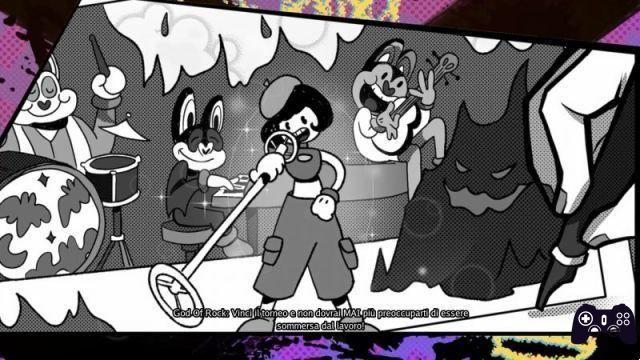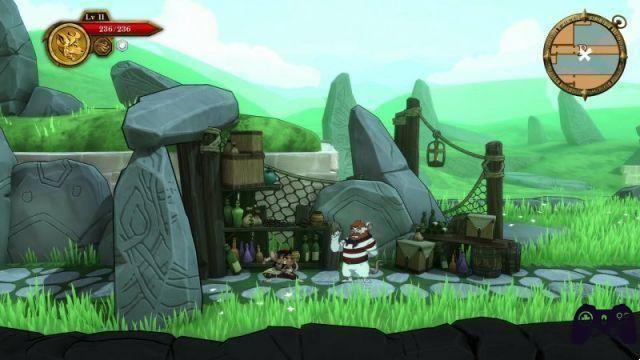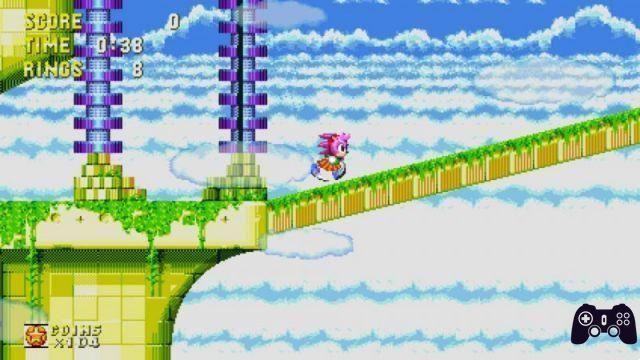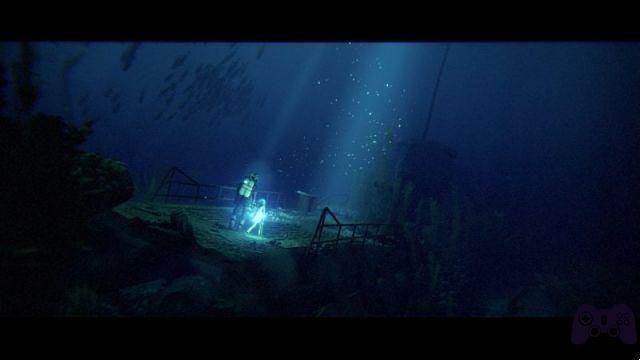Metal Hellsinger showed the world that you can combine a shooter with a rhythm game, while Hi-Fi-Rush is proof that playing a music-driven action platformer can be a joy. Can God of Rock merge Guitar Hero with the world of fighting games? The feat seems impossible, but after spending some time we can confirm our first impressions after trying the demo: the potential is very high and the recipe works.
Developed by modus studiesGod of Rock is a fighting game in which, to hit your opponent and block his blows, you will have to play notes like in Guitar Hero. Each note played is a punch or kick that the character automatically throws and that the opponent automatically stops if he too has correctly timed the note. If they both miss, there is no shot, but if only one of them doesn't press the right button at the right time, they take damage. Additionally, as in any respectable fighting game, there are a number of special moves, combos and ultimates that add notes or modify the opponent's trajectory to make it more likely that they will make a mistake and therefore land a successful blow.
In this Rock God Review We tell you how the developers managed to combine two genres that seem opposite in a really interesting way and how a little more refinement and greater depth in the controls could transform this title even into an electronic sport.
12 stories of frustration

The element you'll love or hate most about God of Rock isn't its combat mechanics (which we think are hilarious), but its characters. If you care about a particular musical icon and seeing it parodied or imitated makes you suffer, you probably won't love many of this game's heroes. However, if you appreciate irony, the authors' quotes will make you laugh a lot. When played in arcade mode, each character has a very brief animated introduction explaining how, in fact, each protagonist of this game is a "loser" trapped in a frustrating job or life situation. This is where the Rock Dio who makes each of them an offer: participate in his extravagant musical fighting tournament in exchange for what they want most. Everyone accepts and thus the narrative context is born.
The most recognizable of 12 protagonists This is undoubtedly King, visibly inspired by Elvis, whose story is that of a failed rock star who needs a push to return to the spotlight. Another very obvious reference is Johann, a great fighter with a German accent who is very reminiscent of the great composer Bach, but who in this universe is an American custom motorcycle enthusiast who wants to travel Route 66. Ziggy is a red-haired alien obsessed with kidnapping cows. to be backup singers for his band (yes, he is wonderfully crazy) whose aesthetic is a mix between the punk of Iggy Pop and the camp style of David Bowie from which Ziggy Stardust took its name. A flower girl could not be missing, Lyn, clearly inspired by Janis Joplin, whose special attacks are decidedly psychedelic. In addition to the legends of the past there are also references to present-day artists like Tophat, who is very reminiscent of John Legend, and Queen who, at least to us, seems inspired by Lizzo. Finally, there are characters invented or inspired by mythology such as Kosaku, who uses the spirits of the Japanese forests to overcome the noise of the cities, or Hilde, a nun with robotic hands who hates the meals at her convent and would like to write. the most beautiful religious hymn of all time. There is no shortage of oddities and we assure you that they do not end here because we have not told you about the cartoonist's porcelain doll or the handsome wrestler/actor in love with his image.
More depth is needed

The first impact with God of Rock is amazing. The concept is so strange that in the first half hour of playing it is hard to believe that everything works and is even fun. If this were simply an unambitious arcade title, everything could stop at the four buttons that serve strictly musical gameplay, but that is not the case. Fighting games are famous for their combos and each character's unique fighting style, and this game managed to find that uniqueness even in its strange format. We tried it on PC but using a controller Precisely because the inputs dedicated to combos are directional and inserting them with a joystick greatly simplifies the experience.
Each character has a bar divided into three sections that, when you play the appropriate notes, fill with yellow. Once filled it is possible to use the ultimate skill, a skill that gives a clear advantage to the user because it overwhelms the opponent with notes to play, always opening an opening to hit. Then there's a special ability that consumes only one of the three sections and alters the music track in some way, which doesn't always help whoever activated it. Each character then has between 3 and 5 combos available for increasingly complex and effective attacks. You'll have to completely recalibrate your brain to be able to input the correct notes with one hand and use the other for the joystick movements needed to perform the combos, but don't worry, The numerous levels of difficulty will come to your aid.. When playing against the computer only from the hard level, your opponent will use combos so you can train with the strictly musical part at first and then focus on combining the stricter part of the fighting game.

God of Rock, however, has a fundamental problem: while you're learning it, the characters (with two exceptions) all look the same. If in Street Fighter the difference in playing style between Chun-Li and Zangief is evident, in God of Rock during the first hours of the game it doesn't matter which hero is chosen, it only matters how well you can play. After mastering the rhythm part and learning some specific scripts for each hero, their personality begins to emerge. Special attacks that add notes to the opponent's trajectory seem to vary very little indeed, only the final attacks are visibly different. Only when the knot of coordination has been untangled does one discover how each character is truly unique. There are those who have a faster or more strategic play style, based on being annoying often, and those who want to build a more powerful attack over time. The only obvious exceptions are Gosaku, who has the ability to change shape unlocking a whole set of different moves (and for this reason is twice as difficult to master and beat due to unpredictability) and the other is Lyn le, whose Movements cover the keys of the notes with flowers (both those of the opponent and their own) and whose ending lengthens and shortens the rhythm of both tracks to put the opponent in difficulties.
It's not a bad repertoire

The other Achilles heel of God of Rock is that, for obvious budgetary reasons, the songs you will compete with are not hits from the history of rock and pop as in Guitar Hero, but are original songs. If from the point of view of attractiveness this choice seems like a big point against it, analyzing the gameplay it is clear that there were also behind it design reasons. Unlike games based on iconic themes, God of Rock cannot impose a duration limit on its matches dictated by the length of a particular song, also because, if players prove to be good and attentive, a match could stagnate. in a stalemate in which Both hit all the right notes and neither shot hit the mark.
To prevent this phenomenon, God of Rock has 50 original songs composed of different sections designed to repeat according to pre-established loops. This allowed the developers to set specific points in combat to increase the musical intensity if nothing happens for too long. In fact, each level of difficulty corresponds to a certain number of notes per time interval; The more difficult the challenge becomes, the more the scores multiply within the same space. This measure is different from the intensity of the piece and allows, while maintaining the same number of notes per time interval (the difficulty), to insert more complex combinations and transitions. This makes God of Rock a lot of fun both against the computer (against which you never win easily) and against friends, who face a challenge that is never the same. The eight different stages, then, do a good job of differentiating the stages, even if your eye will be too busy following the notes and managing the combos to notice anything else. Finally, for the most dedicated, there is an editor to create custom tracks from the available songs and with endless customization possibilities.
Conclusions
Tested version PC with Windows digital delivery Steam, playstation store, Xbox Store Price 29,99 € Holygamerz.com 7.0 Readers (4) 8.8 your voteGod of Rock has achieved an impossible feat: combining a fighting game with Guitar Hero. The gameplay surprises, entertains and, once you get past the initial confusion, offers a world of possibilities with a gentle learning curve but one that should not be underestimated. The characters, however, fail to diversify each other enough in their play style, especially in the first few hours, it takes a long time to grasp the subtleties of each one. There are online matches but they are not very populated and the system that regulates the classifieds needs an adjustment because we only find very unbalanced matches. The potential is there in terms of fun for both those who play and those who watch, but if God of Rock wants to carve out a space in the world of fighting games with competitive ambitions, it will have to do more to differentiate the style of each hero and providing the community with more dedicated stretch goals and a circuit of regular online events. However, if you are looking for a game for a carefree rock evening, this title, thanks to its very simple musical mechanics, is a wild and accessible alternative to Guitar Hero that will keep you entertained for a long time.
PRO
- Perfect combination between fighting game and rhythm game
- Music that fits well with the game.
- Characters with a pleasantly strange design.
AGAINST
- Little depth in the combined design.
- Online Matchmaking Worth Checking Out






